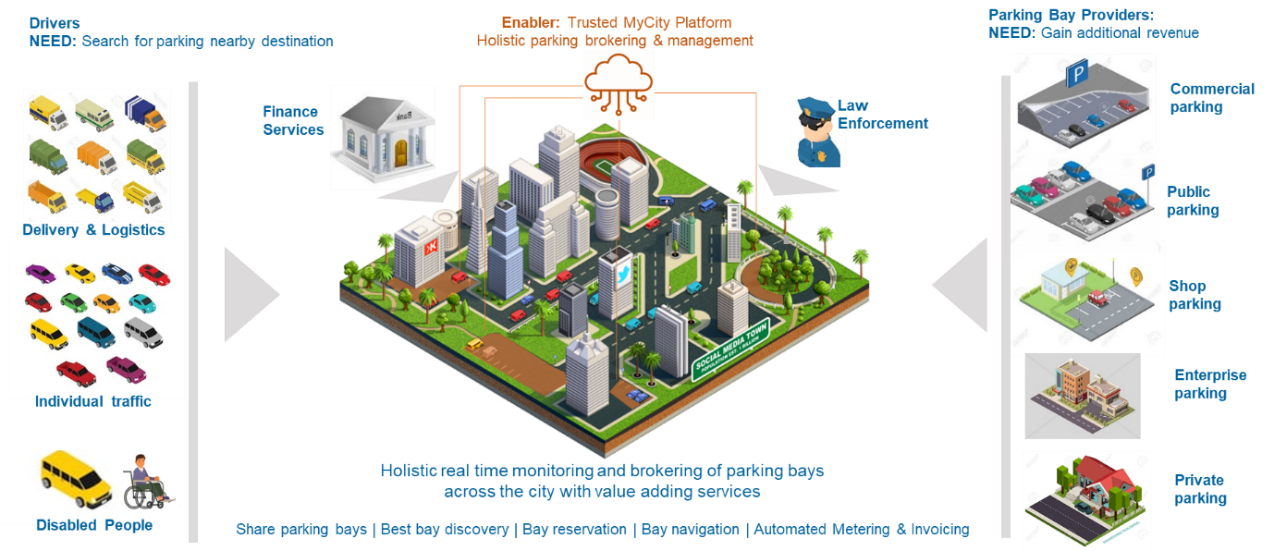
Smart city parking
Thomas Bierhoff
Atos Germany, Head of Technology
Multi-sided, cloud-based business platforms have demonstrated their power and economic value in the past decade, most prominently represented by success stories like Amazon Marketplace. It turns out that brokering of offerings and demands on a highly automated digital platform provides even more revenues than selling services and products.
Collaboratively addressing the dilemma of parking in a smart city through a multi-sided business platform is the next step for cities and their stakeholders.
Pressures on drivers and the environment
While public transport is often pushed by city authorities to reduce traffic volumes and make the trans-modal shift work, the growing volume of individual traffic is still challenging — especially during rush hours. These challenges are exacerbated by the limited amount of parking sites. Drivers look for parking near their destination, but if they are unable to find a suitable place immediately, they are forced to continue driving until they find a parking site by chance. These driving odysseys produce significant pressure on traffic, generate additional air pollution and emission and put stress on drivers.
There are many research studies available about traffic volume and its impact on cities. One such study is the 2017 INRIX study, which investigated the impact of parking site gaps in German cities on inner city traffic congestion. These investigations have uncovered the fact that the lack of parking sites in inner cities is a major cause for traffic congestion. The study analyzed the traffic problem from an environmental, monetary and time perspective and included multiple stakeholder views. Some key facts and figures of the study are listed here to illustrate the importance of smart parking solutions for keeping traffic manageable.
Timewise, key facts and parameters mainly focused on the amount of time drivers spend searching for parking sites inside the ten largest cities in Germany. On average, drivers spend 41 hours per year searching for open parking spots in inner cities. This time is not only unproductive, but also very stressful for drivers, especially when they are under time pressure.
The environmental aspects focused on greenhouse gas emission, considering a mix of diesel and petrol driven combustion engines. The study used a moderate fuel consumption of 8 liters/100 km for petrol and 5.5 liters/100 km for diesel cars for inner city traffic. Assuming a greenhouse gas emission factor of 23.8 for petrol cars and 26.5 for diesel cars, the overall greenhouse gas emission amounts to a tremendous 2.3 kg per year per driver. Even without accounting for other air pollution (such as fine dust, hydrocarbons and sulfur dioxide), this figure clearly shows that parking challenges put strong stress on environmental conditions.
Holistic approach for multiple stakeholders
Parking is a multi-dimensional challenge in cities for a multitude of stakeholders, including but not limited to, individual drivers, logistics and delivery service companies, local shops and stores, local companies, city residents, private parking providers, law enforcement and city administrations. In general, these stakeholders can be subclassified into those who search for parking opportunities and those who provide parking opportunities. In order to holistically capture the parking problem and its impact, the needs and requirements of the stakeholders on both sides must be considered.
Solutions to improve public parking require a holistic approach which unifies the existing types of proprietary public parking systems and sensors to gain an overall view of the current and anticipated parking situation inside the city. Moreover, it must provide an open architecture with a high degree of adaptability to emerging parking technologies to ensure technological sustainability and future-proofing. As a third challenge, it must also offer a multitude of digital capabilities to serve the needs of various stakeholders in a trusted and secure solution. Meeting this last requirement depends on system reliability and data privacy, handling monetized processes with care by trusted organizations.
Integrated system-of-systems
In general, this overarching solution must master a “system-of-systems” and integrate a large variety of proprietary parking systems, parking sensor systems and their related information and communication systems. The primary challenge is the integration of existing parking systems without the ability to adapt them — as they are often not standardized or interoperable, or simply do not provide any digital interface for system integration purposes.
Another challenge is the vast amount of heterogeneous system devices and sensor technologies in the field, which require unified device management for monitoring proper operation and providing fraud detection. This is a technological challenge due to both the use of proprietary devices and communication technology, and the high number of devices in the field. With the emergence of the Internet of Things (IoT), these will only increase as IoT technology enables highly distributed but interconnected parking sensor systems.
Smart public parking platform
The open solution concept of an Urban Data Platform will enable cities to address
the public parking management challenge on a city-wide level and target the integration of existing parking systems to gain digital transparency about the current parking condition inside the city. Based on this real-time transparency, several digital services can be offered to meet stakeholder needs.
Thus, what is required is an overarching “Smart Public Parking Platform” which represents a system-of-systems that puts single, trusted responsibility in the hands of the smart city traffic administration. Stakeholders such as parking providers can decide to what degree they will participate, and to what extent they will outsource their parking services and business operations.

The Urban Data Platform will provide the basis for a multi-sided smart parking platform that serves stakeholders who are searching for parking opportunities as well as those who provide the parking sites. It will enable a virtual marketplace to bring both kinds of stakeholders together effectively for holistic public parking management at a city level. With this market platform in place, smart cities will become more attractive for their citizens and visitors.
Topics
Innovation in a Box Workshop
Let’s get started solving your challenges together
Public Data Platforms
Discover solutions for Public Sector & Defense
